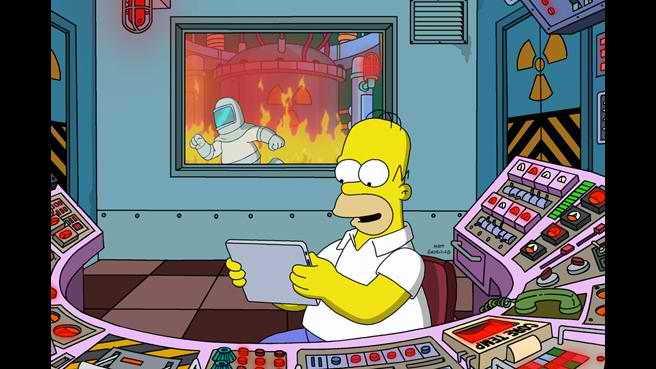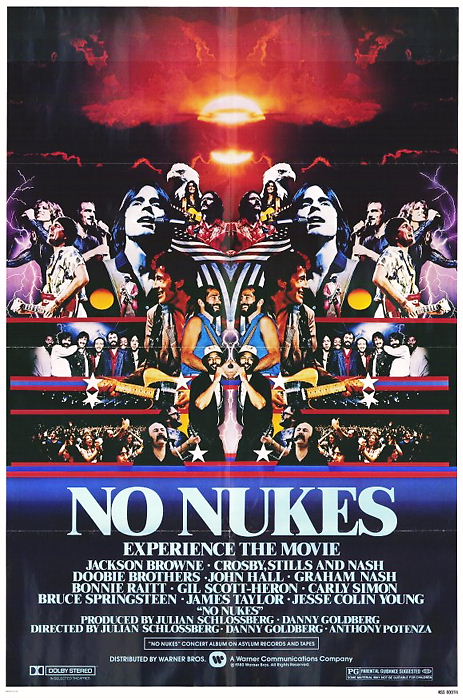GEORGIA TOPLEY investigates the threat of nuclear power and the protest music it should continue to provoke.
During the Cold War period, Albert Einstein, the father of modern nuclear physics, allegedly stated, ‘had I known [it would lead to this] I should have become a watch maker’. In his view the greatest scientific revolution of humankind might not have been worth the risk – of destroying all natural life on earth. Writer Martin Amis puts it characteristically bluntly: nuclear weapons are ‘clearly the worst thing that has ever happened to the planet’. Scientific advances, rather than being engaged with prolonging life, are being utilised as a means with which to end it extremely efficiently.

Nuclear power has always been a controversial subject. Pro-nuclear advocates argue that it is ‘greener’ as it does not produce carbon emissions. What is often overlooked is that the necessary cooling processes create thermal pollution, which alone overcompensates for the lack of greenhouse gas emissions. There have been reports of river water near nuclear power plants being ninety degrees Fahrenheit. Compared with fossil fuels, which cause slow deterioration of the biosphere, nuclear power causes more severe damage to the environment at a faster rate. Any argument for nuclear power on the basis of it being ‘cleaner’ is naïve and reductive. Staunch anti-nuclear activist Bonnie Raitt is uncompromising: ‘no one in the world should say they are for nuclear energy unless they are willing to have a plant or dump built across from where they live’. The only ‘clean’ form of energy production is to use our renewable natural resources.
Ronald Reagan, a pro-nuclear advocate, claimed that ‘all the waste in a year from a nuclear power plant can be stored under a desk’. Although this is a barefaced lie, Reagan does admit something in the statement: nuclear waste cannot be destroyed – it can only be ‘stored’. In effect leaving the mistakes of the current generation for the next to clean up. We keep burying nuclear waste, with no idea what the full repercussions may be, perhaps in the hope that if it is out of sight it will be out of mind.

In 1979, there was an ‘accident’ at the Three Mile Island nuclear power plant, widely regarded as the most serious in the history of American nuclear power. The word ‘accident’ misleadingly implies that the event is without an apparent cause. Shocked contemporaries could not believe the centrality of human error to the Three Mile Island disaster; we, however, need to be aware that nuclear power plants are disasters waiting to happen. We can guarantee that nuclear power will not be one hundred per cent safe as long as human beings are involved in the process. That Homer Simpson works in a power plant actually highlights an important issue – worryingly, somebody like him could be in charge of any aspect of a nuclear power station near you.
Songs have forever been used to raise social issues, but the American counterculture movement of the 1960s and 70s made protest music a global phenomenon. Protest music became a way to, in the words of David Crosby (of Crosby, Stills & Nash), ‘respond to the world slapping us in the face’ – in direct response to nuclear lies. The formation of M.U.S.E (Musicians United for Safe Energy) was promoted by outrage at the government’s response to the Three Mile Incident. Graham Nash unequivocally called the official statement – that ‘very small amounts of radioactivity’ had ‘negligible effects’ – ‘complete bullshit’. Instead, Nash elucidates, ‘horror stories about birth deformities and deaths’ were covered up to ‘avoid panic’.

To heighten public awareness of the threats posed by nuclear power MUSE organised a series of concerts in Maddison Square Gardens, interspersed with speech and film on nuclear issues, called ‘No Nukes’ – to raise money for anti-nuclear groups and provide the audience with information to form their own opinions on nuclear issues
‘No Nukes’ showcased some of the biggest names in the music industry at the time, who all agreed to play for free as self-titled ‘concerned citizens of the world’. Crosby, Stills, and Nash put aside their differences and reformed to fight the far more serious issue of nuclear power. Compare this attitude with that of the global super powers in the ‘nuclear club’, who have consistently refused to demobilize their weapons for the greater planetary good.
During his performance at ‘No Nukes’, Gil Scott-Heron brings the issue of government sponsored capitalism into the debate: he states that the corporations running the power plants simply do not care about possible dangers as ‘when it comes to people’s safety / money wins out every time’. Indeed, as Jackson Browne states in a documentary made on the concerts, ‘I wanna know why my life is being endangered by someone’s profit margins’.
With all the evidence proving the dangers of nuclear power, the only reason for governments and companies to remain pro-nuclear appears to be financial incentive. As Jesse Young states ‘we are doing a lot of things in the world with our technology to destroy ourselves’, and not using our collective resources to solve global problems. Quite frankly if there were to be a nuclear war, I would prefer to be on the ‘losing’ side rather than to live to see the catastrophic effects we have had on our planet in the name of nationalism and the economy.
In regards to nuclear power, we need to face the music. With ‘a proven track record of catastrophic failure’ the only explanation for our continued reliance on nuclear power is that rampant state-sponsored capitalism prevails: the lives of all are risked for the profits of some. All of the arguments put forward by musicians during the American counterculture movement are painfully, urgently relevant today – with the Trident missile and a new generation of Nuclear Power stations, like that at Hinkley Point, given the green light. Today, more than ever, we need anti-establishment protest songs, to combat the government’s dangerous – and too often unchallenged – narratives about nuclear power and the necessity of nuclear weapons. We must continue to bring these disputes into public consciousness and ‘stand up, stand and fight’.

